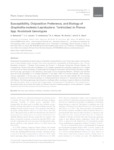Por favor, use este identificador para citar o enlazar este ítem:
http://www.alice.cnptia.embrapa.br/alice/handle/doc/1073882| Título: | Susceptibility, Oviposition Preference, and Biology of Grapholita molesta (Lepidoptera: Tortricidae) in Prunus Spp. Rootstock Genotypes. |
| Autor: | BERNARDI, D.  LAZZARI, J. C.   ANDREAZZA, F.   MAYER, N. A.   BOTTON, M.   NAVA, D. E.   |
| Afiliación: | Laboratory of Entomology, Embrapa Clima Temperado, BR 392 Km 78, Caixa Postal 403, Pelotas, RS 96010-971, Brazil (dbernardi2004 @ yahoo.com.b Laboratory of Entomology, Embrapa Clima Temperado, BR 392 Km 78, Caixa Postal 403, Pelotas, RS 96010-971, Brazil (dbernardi2004 @ yahoo.com.br jose.cesarlazzari @ hotmail.com Department of Entomology, Federal University of Vic ?osa, Av. Peter Henry Rolfs, s/n, Vic ?osa, MG 36570-900, Brazil (andreazzafelipe @ yahoo.com.br) Laboratory of Entomology, Embrapa Clima Temperado, BR 392 Km 78, Caixa Postal 403, Pelotas, RS 96010-971, Brazil (dbernardi2004 @ yahoo.com.br jose.cesarlazzari @ hotmail.com alex.mayer @ embrapa.b MARCOS BOTTON, CNPUV DORI EDSON NAVA, CPACT. |
| Año: | 2017 |
| Referencia: | Environmental Entomology, v. 0, n. 0, p. 1-7, 2017. |
| Descripción: | Studying the susceptibility of peach trees to Grapholita molesta (Busck) is one of the major steps in the develop- ment of pest-resistant peach varieties. This work evaluated the susceptibility of 55 genotypes of the "Prunus Rootstock Collection" ("Coleção Porta-enxerto de Prunus ") of Embrapa Temperate Climate (Pelotas, Rio Grande do Sul, Brazil) to the natural infestation of G. molesta , assessed the oviposition preference of G. molesta in choice and no-choice bioassays, and estimated the biological parameters and the fertility life table on different Prunus spp. genotypes in the laboratory. Genotypes Prunus kansuensis (Rehder), I-67-52-9, and I-67-52-4 were the most susceptible to G. molesta infestation in the field ( > 60% of branches infested), while 0 Sharpe 0 ( Prunus angustifolia x Prunus spp.) and Prunus sellowii (Koehne) were the least infested (0% of branches infested). In choice and no-choice bioassays, G. molesta preferred to oviposit on P. kansuensis when compared with Sharpe. The Sharpe genotype also showed an antibiosis effect, resulting in negative effects on the fertility life table parameters when compared with the genotypes P. kansuensis and 0 Capdeboscq. 0 The results found in the present study can provide information to initiate a long-term breeding program moving desired G. molesta resistance traits from the rootstock into the Prunus spp. cultivars. Keywords : Rosaceae, insect resistance, antibiosis, antixenosis, oriental fruit moth |
| Thesagro: | Inseto Grapholita molesta |
| NAL Thesaurus: | Rosaceae antibiosis antixenosis |
| Palabras clave: | Insect resistance Oriental fruit moth |
| DOI: | 0.1093/ee/nvx114 |
| Tipo de Material: | Artigo de periódico |
| Acceso: | openAccess |
| Aparece en las colecciones: | Artigo em periódico indexado (CNPUV)  |
Ficheros en este ítem:
| Fichero | Descripción | Tamaño | Formato | |
|---|---|---|---|---|
| BottonEnvEnt2017.pdf | 273,97 kB | Adobe PDF |  Visualizar/Abrir |









